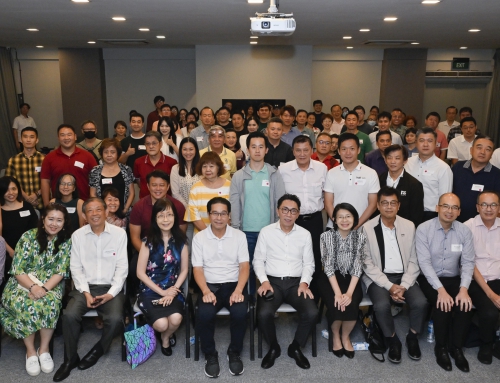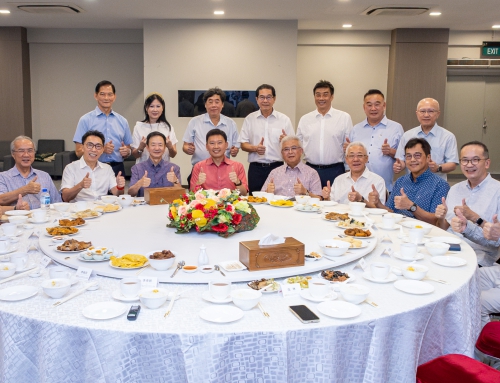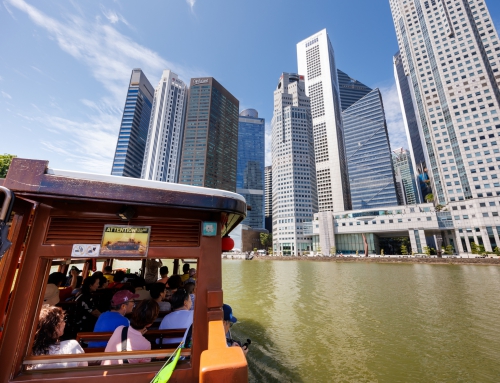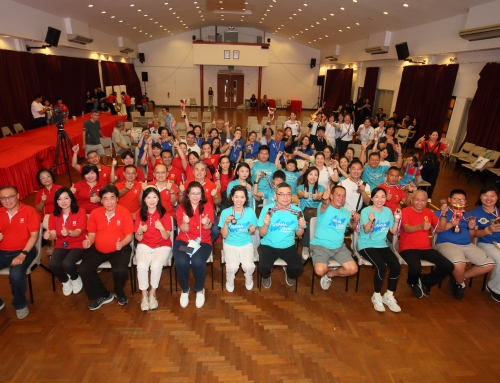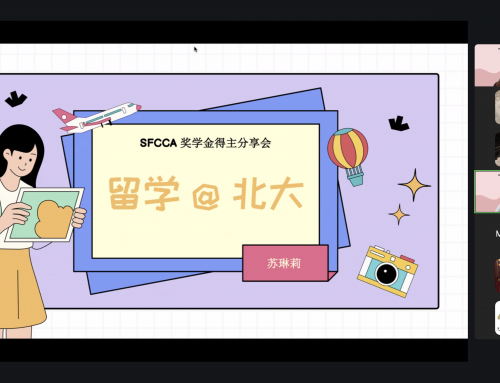Book Launch: English Edition of “A General History of the Chinese in Singapore”
The English edition of “A General History of the Chinese in Singapore” was launched by Minister for Social and Family Development and Second Minister for National Development Mr Desmond Lee on 24 June 2019 (Monday), 7pm, at Fort Canning Centre’s Black Box.
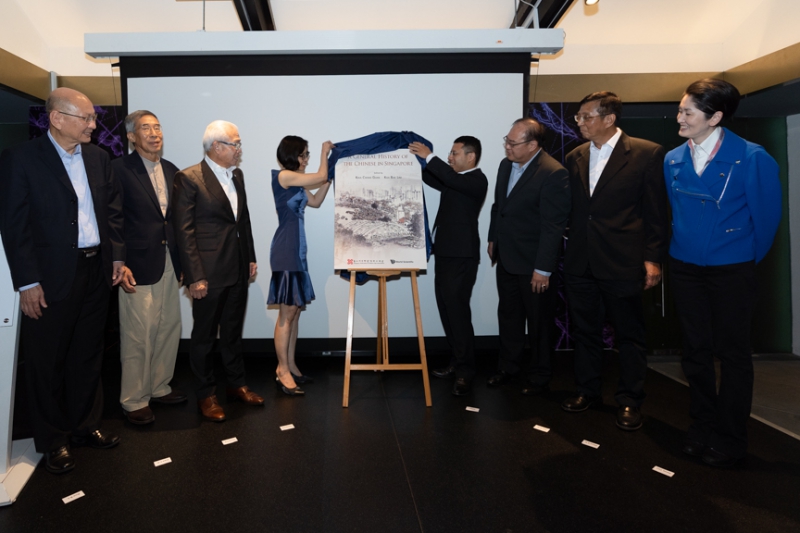 Minister for Social and Family Development and Second Minister for National Development Mr Desmond Lee (fifth from left) unveiling the cover of “A General History of the Chinese in Singapore” with Ms Chang Hwee Nee, CEO of National Heritage Board (fourth from left) at the book launch. With them on stage (left to right): Co-chief editors of the book, Mr Kua Bak Lim and Prof Kwa Chong Guan; Mr Chua Thian Poh, Honorary President of SFCCA; Mr Tan Aik Hock, President of SFCCA; Mr Chua Hong Koon, Publishing Director, World Scientific Publishing; and Mr Gene Tan, Executive Director of Singapore Bicentennial Office
Minister for Social and Family Development and Second Minister for National Development Mr Desmond Lee (fifth from left) unveiling the cover of “A General History of the Chinese in Singapore” with Ms Chang Hwee Nee, CEO of National Heritage Board (fourth from left) at the book launch. With them on stage (left to right): Co-chief editors of the book, Mr Kua Bak Lim and Prof Kwa Chong Guan; Mr Chua Thian Poh, Honorary President of SFCCA; Mr Tan Aik Hock, President of SFCCA; Mr Chua Hong Koon, Publishing Director, World Scientific Publishing; and Mr Gene Tan, Executive Director of Singapore Bicentennial Office
Did you know that in the early 19th century, Singapore was a printing centre for the British and American missionaries? During that time, about 500,000 volumes were printed in Singapore to provide overseas Chinese with information barred by the Qing government. This made Singapore a centre of publishing, especially for Chinese and Baba literature works in the Malay Archipelago. Numerous Chinese terms for a wide range of subjects (ranging from as religion, science and technology, social science, culture, political science, history and geography) which we still use today were created then, by writers, translators and publishers in Singapore.
This latest edition of “A General History of the Chinese in Singapore” reveals nuggets of information like the aforementioned crucial but lesser known contributions of Singapore’s Chinese community, as it delves into Singapore’s history beyond 1819. Through its tumultuous history, the events of notable characters of this narrative, and the criss-crossing complexity, the authors show how the Singapore Chinese-originating from origins in China, Penang, Malacca, and Riau Archipelago-came to this island and together with the other ethnic groups here, strived and worked together in concert with the government of their day to build a nation and craft sound and effective growth policies that paved the way to today’s economic and political transformation. Though often referred to as the ‘English Edition’, this book is far from a direct translation of the 2015 Chinese edition – approximately three-quarters of this edition’s contents were authored just for this book.
Other interesting milestones in Chinese history the reader can expect to find in this book include the often overlooked role of Chinese secret societies in building the social fabrics in Singapore; the lesser known history of Singapore hidden in plain sight amongst the tombstones in places like Bukit Brown Cemetery; the juxtaposition of the two ‘classes’ of Chinese elite-the Queen’s Scholars, and the local grassroots leaders and their role and contributions to the establishment of modern Singapore; how the Arts came to Singapore; how World War II led to a key political change in the hearts and minds of the Chinese in Singapore from the mindset of “overseas Chinese” to “local Chinese”; and the important lesson the Peranakan Chinese in Singapore have for this nation and other plural societies.
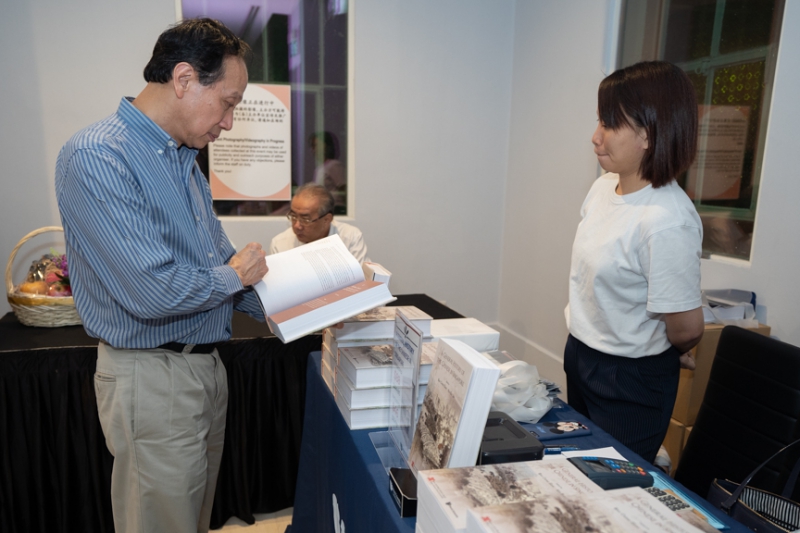 The English edition of “A General History of the Chinese in Singapore” comprises over 900 pages and 38 essays, and involved a total of 26 authors and seven translators
The English edition of “A General History of the Chinese in Singapore” comprises over 900 pages and 38 essays, and involved a total of 26 authors and seven translators
About the Book
Co-published by the Singapore Federation of Chinese Clan Associations and World Scientific, “A General History of the Chinese in Singapore” (English edition) provides a lens through which readers can grasp an entry level overview of the complex historical mosaic that constituted the challenges faced in the development and birth of a nation that was not meant to be. Through the study of the Chinese community and its over 700 years of history, the publishers hope that readers interested in pursuing further research can use this book as a key to unlock and follow up on several important links established during this historical narrative.
At the book launch, President of Singapore Federation of Chinese Clan Associations, Mr Tan Aik Hock, said: “With ‘Pride in our Past, Legacy for our Future’ as the key objective, we hope that this volume will allow the future generations to have a deeper insight into Singapore Chinese history, as well as the struggles our pioneers went through, so that the young can understand their spirit, be inspired to continue these values and strive for a better Singapore.”
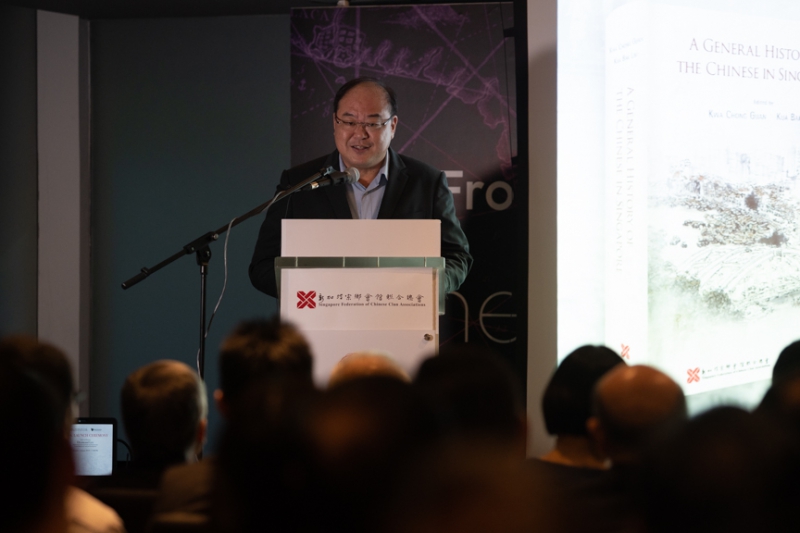 SFCCA President Mr Tan Aik Hock speaking at the book launch, thanking the editors and publishing team for their hard work
SFCCA President Mr Tan Aik Hock speaking at the book launch, thanking the editors and publishing team for their hard work
Both editions of the publication are co-funded and supported by the National Heritage Board’s Heritage Project Grant. Said Mr Max Phua, Managing Director of World Scientific Publishing, about the book, “World Scientific is happy to be working with the Singapore Federation of Chinese Clan Associations to co-publish this important and essential volume on the history of the Chinese in Singapore. This is a huge reference work which would benefit researchers, historians and school students in fostering an understanding and appreciation of our heritage.”
Co-editor of the English edition, Prof Kwa Chong Guan, pointed out during his speech that in the book, it was highlighted that the earliest Chinese immigrants did not come to Singapore with Sir Stamford Raffles; neither were they invited by Major-General William Farquhar to settle down here. Instead, the Chinese immigrants had arrived earlier than Raffles did. It was though strong connections within various Chinese communities that then gradually expanded and developed the Chinese community in Singapore.
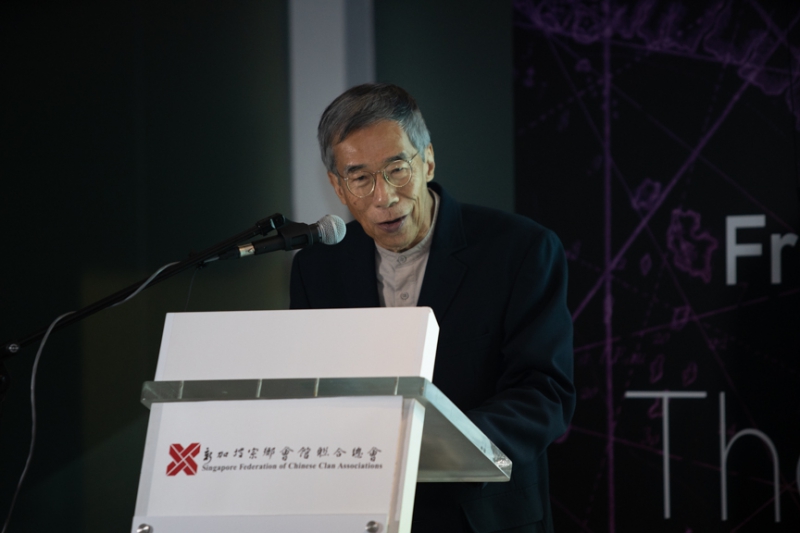 Renowned Prof Kwa Chong Guan sharing his thoughts on co-editing the book and highlights of the English edition
Renowned Prof Kwa Chong Guan sharing his thoughts on co-editing the book and highlights of the English edition
New Edition, with Newly-Added Content
The English edition of “A General History of the Chinese in Singapore” is not a direct translation of the original Chinese edition. Recognising that the motivations and interests of its target audience of mainly English-educated readers are different from that of readers of the Chinese edition, adjustments were accordingly made. The over 900-page work includes 38 essays, covering a wide range of topics. Spanning across politics through the different eras, Overseas Chinese identities, bang social structures and their power bases, the transplanting of traditional Chinese religious beliefs in Nanyang, as well as the development of Chinese business, arts, printing press, and education.
Nine essays originally available in the Chinese edition were preserved and translated for this volume. They cover the Chinese junk trade and its impact on the formation of Singaporean Chinese society and culture; Chinese leadership and its political transformation; the Peranakan community and culture; a century’s history and impact of Chinese Dailies; the introduction, rise, and impact of Chinese remittance in Singapore; the Anti-Japanese National Salvation Movement; a commentary on Lee Kuan Yew himself; a study of Singapore Chinese in retrospect; and the subject of new Chinese immigrants.
Other Information
The Chinese edition of “A General History of the Chinese in Singapore” (新加坡华人通史) was launched by Prime Minister Lee Hsien Loong on 9th November 2015. During the launch, PM Lee commended the book as “a precious gift from the Chinese community to Singapore”. Following the overwhelming response to the Chinese edition, the Singapore Federation of Chinese Clan Associations (SFCCA) decided to produce an English edition to reach out to a broader readership through the English medium, especially the non-Chinese population, other ethnic Chinese, as well as to the international audience interested in history of modern Singapore. The English edition is also timed to coincide with Singapore’s bicentennial commemoration in 2019.
Sale Information
The English edition of “A General History of the Chinese in Singapore” is available for purchase now. To get a copy of the book, interested parties may contact the SFCCA Secretariat at 63544078 or admin@sfcca.sg.

